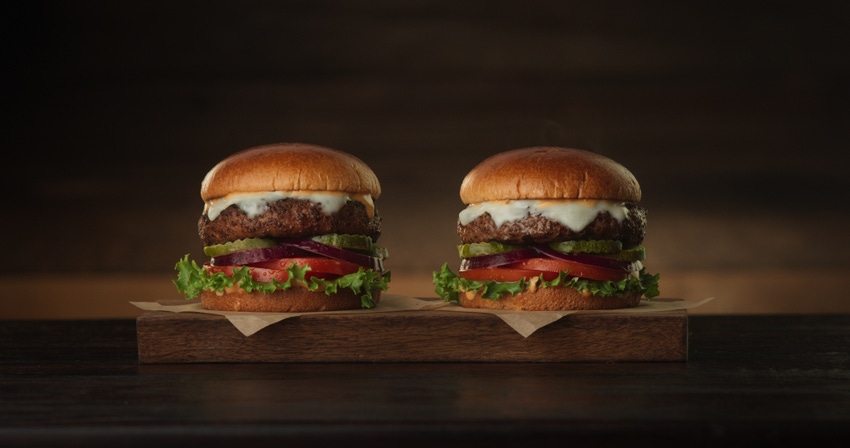Market research shows all imitation meat categories are up and the growth curve is rapidly accelerating.

On Dec. 6, 2017, I wrote a column about the Six Greatest Ag Challenges for 2018. Number 5 was plant-based meat substitutes. I wrote, "After years of hanging around the far distant fringes of even the most healthier-than-thou hippy co-ops and vegetarian prone supermarkets, faux burgers and holiday tofurky products are becoming mainstream. Market researchers estimate total sales of dairy and meat alternatives will reach $25 billion in just two very short years."
Maybe it won't take that long, and I definitely was speaking in too narrow of a context. Perhaps I should have written more broadly. Rudely shouldering aside, the slow culinarian crawl of bean burgers from the center-of-the-plate is the rapid consumer acceptance of cell-based meat. For the time-being, though, let's treat these two products as the same: lab-created interlopers coveting the center-of-the-plate.
That nasty old faux burger that usually tasted of something that belonged in old Dobbin's feed bag, and might have been made with the same ingredients, is being overshadowed by what might be called almost real meat. It starts with cells gleaned from beef but its grown in a laboratory-like environment. Its peddlers wanted to call it 'clean meat,' something the real meat guys find objectionable.
The obvious and incorrect inference was cell-grown meat was clean; real meat was dirty or at least not clean. Aiming at that misconception, Missouri passed a law intended to promote 'truthiness' in labeling. It went into effect at the end of August and said if it didn't come directly from cows, pigs or poultry, it can't be called meat.
Okay, said the producers of cultivated or “lab-grown” meat in a half-hearted attempt to circumvent the Missouri law. Meeting at the Good Food Conference at University of California-Berkeley, they announced plans to form a trade association and to call their product “cell-based meat.” At the same time, an odd group of BFFs -- The Good Food Institute, Animal Legal Defense Fund, ACLU of Missouri and Tofurky -- filed a lawsuit against the Show-Me state's new law. The suit was tenuously based on a call for freedom of speech, which they claimed had been infringed. Truth in labeling must have been deemed unimportant by their legal team.
Their newly announced trade association could eventually find itself going head-to-head with current industry best friend, the North American Meat Institute (NAMI). NAMI joined Memphis Meats, one of the most market aggressive firms selling cell-based meats, to ask the Trump Administration to establish shared regulatory roles for both the Food & Drug Administration and the U.S. Department of Agriculture. Well, before the Good Food Conference, the two groups suggested the term “cell-based meat and poultry” should be the proper terminology.
Whatever you want to call these things, sales are hot. At the Good Food Conference, Good Foods Institute director of corporate engagement Alison Rabschnuk said, “As consumers look to decrease their meat consumption, more and more people are choosing plant-based meat. In fact, 12% of households across the U.S. now purchase plant-based meat.”
Her numbers might be optimistic, but plant-based and cell-based meats have expanded from trendy/faddy hipster vegetarian restaurants to the very heart-and-soul of the burger business. White Castle, home of the 'slider,' revered for years by late night over-imbibers, announced it will start selling Impossible burgers made from wheat, coconut oil, potatoes and plant-derived heme, at every one of their 400 restaurants. The mini-burger chain joins main-stream places like Big Boy, A&W and TGI Fridays in this fast-moving non-real meat menu expansion.
Market research shows all imitation meat categories are up and the growth curve is rapidly accelerating. While total U.S. retail food sales grew just 2% in 2017 over the previous 12 months, retail sales of plant-based foods (supermarkets and restaurants) grew more than eight times as fast during the same time period.
Sales of plant-based meats quadrupled the past year, up from 6% growth in 2016. Oddly, some of the greatest growth is coming from the center of the country, the very heart of American meat production and consumption. For instance, refrigerated plant-based meat sales are growing fastest in the Rocky Mountain region, while frozen plant-based meat sales are growing fastest in the West South Central region, which includes Texas.
Leading the way is Beyond Meat with sales up 70%. Next is Field Roast at 68%; relative old-timer Gardein checks in at 51%. Praeger’s says they're growing at 44%, and British-based Quorn's sales are up 31%. Even from relatively small bases, those are impressive growth numbers. As restaurants sitting in every price range continue to 'sample' these products to a wide audience and the price comes down to a more competitive point with real meat, expect to see two things: even more impressive sales growth and faux burgers muscle their way into your neighborhood supermarket's service and self-service meat cases.
One last note: A few days ago, I ate an omelette at one of those trendier 'healthy food' restaurants. It featured something called coconut bacon, slices of fried coconut pieces soaked in liquid smoke. I'm drawing an irrevocable line in the culinary sands.
About the Author(s)
You May Also Like

.png?width=300&auto=webp&quality=80&disable=upscale)

